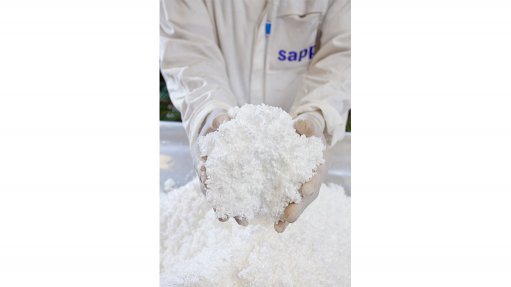
THE GREEN FACTOR The underlying demand for dissolving pulp, packaging, office paper and tissue, in South Africa, and speciality papers abroad, remains strong, driven by global sustainability trends
Global demand for paper, pulp and board is expected to soften in the first half of this year, compared with the highs of last year, where severe supply chain constraints created paper shortages worldwide, says global renewable resource company Sappi.
“This significantly boosted sales orders, as our downstream value chains sought to replenish stocks. Recent improvements in global supply chains have resulted in a reduction in delivery lead times and improved customer inventory levels at the end of 2022,” explains Sappi Southern Africa CEO Alex Thiel.
Global sustainable packaging and paper group Mondi also continues to experience softer demand and pricing,and expects destocking to continue throughout the first quarter of this year.
Sappi expects the short-term global outlook for pulp, paper and board to be negatively impacted on by the final phase of the downstream inventory destocking cycle, but demand is expected to normalise in the second half of the year, when inventory levels return to historical levels.
Thiel explains that the removal of logistical bottlenecks caused the rapid accumulation of downstream inventory in all major product categories and has temporarily suppressed demand.
Further, ongoing geopolitical turmoil, owing to the Russia-Ukraine war, rampant inflation, rising interest rates and an underperforming Chinese economy continue to weigh on general global economic sentiment.
Notably, in December last year, Mondi confirmed an agreement to sell its three Russian packaging converting operations.
As it enters 2023, the group, which operates production facilities in Merebank and Richards Bay, in KwaZulu-Natal, expects significant geopolitical and macroeconomic uncertainties to remain, according to Mondi’s results for the year ended December 31, 2022, published last month.
However, the elevated input costs experienced during the period under review, owing to significantly higher energy, wood and chemical costs, are mostly starting to decline. This is except for wood prices, which remain elevated.
Sappi, which operates the Lomati sawmill and Ngodwana mill, both in Mpumalanga, and the Saiccor, Stanger and Tugela mills, in KwaZulu-Natal, agrees that the global economy will face significant challenges this year.
Although, the recent easing of the energy crisis in Europe, the slowing of global inflation and the opening of the Chinese economy are positive economic indicators, says Thiel.
Notwithstanding the challenges it faces, Mondi remains confident of its product portfolio and business model.
“The underlying demand for dissolving pulp, packaging, office paper and tissue, in South Africa, and speciality papers abroad, remains strong, driven by global sustainability trends,” says Thiel, adding that Sappi’s wood-based products are a perfect fit for a low-carbon, circular economy.
Mondi says making packaging that is fit- for-purpose and contributes to a circular economy helps the group play its part in tackling some of the world’s biggest sustainability challenges – from food loss to plastic pollution, nature loss and climate change – by delivering packaging solutions that are designed at the outset with sustainability in mind.
“In 2022, 82% of our revenue was from packaging and paper products that are reusable, recyclable or compostable, [compared with 77% in 2021],” according to Mondi’s results.
In September last year, Sappi commissioned a new, cutting-edge coating machine at its specialised paper mill in Alfeld, Germany, that will produce paper products that provide sustainable alternatives for traditional plastic film and foil-based material packaging.
“This in-house technology will not only increase coating capabilities but also boost the development of innovative, sustainable, high-barrier, functional packaging solutions. We are excited about the potential for new products from this machine this year,” states Thiel.
Sappi’s Stanger mill, in KwaZulu-Natal, which uses a certain percentage of bagasse (sugar cane waste residue) in the production of office and tissue paper, will in future expand its use of bagasse in combination with pulp to produce compostable thermomoulded food-grade utensils such as plates and bowls.
“This aligns with resource efficiency, circularity and market demands for higher levels of biodegradability, particularly in fast food applications,” explains Thiel.